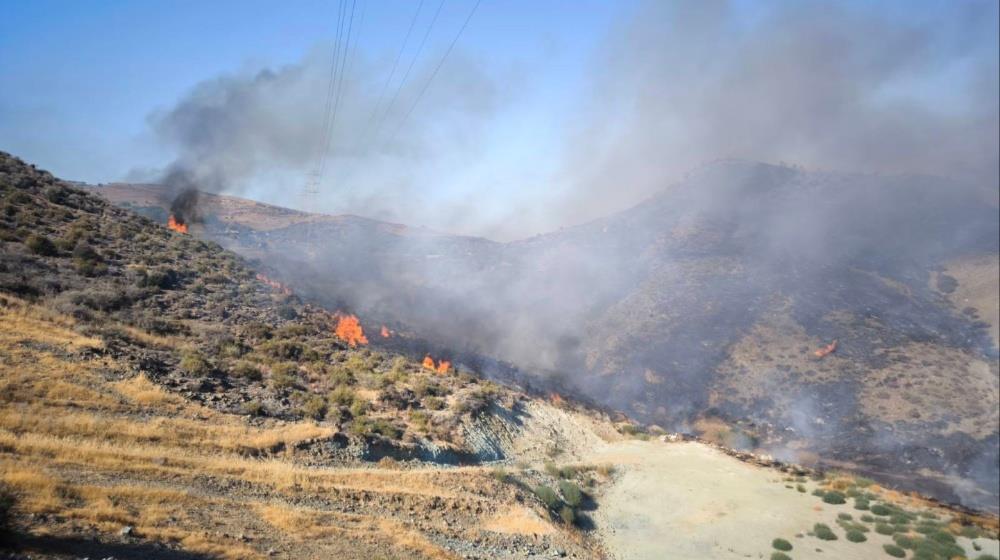The evaluation of damage costs to buildings affected by the devastating wildfires in the Limassol district is entering its final stage, the Interior Ministry’s Permanent Secretary, Elikkos Elias, told a joint session of the Parliamentary Committees on Interior, Agriculture, Natural Resources and Environment.
Speaking on 18 September, Elias said that the Scientific and Technical Chamber of Cyprus (ETEK) had submitted 714 assessment reports for properties that suffered partial or total destruction. The Evaluation Committee has so far reviewed 689 of them and is expected to complete the process within days.
“Work is progressing quickly so that compensation payments can be disbursed,” Elias noted, adding that priority was given to permanent residences. Of the cases reviewed, 150 have been completed, 111 owners have been called to sign declarations of acceptance for the estimated compensation amounts, and 226 have been asked to submit additional documentation.
Another 104 properties were found to be unlicensed, with owners instructed to apply for the necessary permits. Meanwhile, 69 cases fall under compensation schemes managed by other ministries and services, while 29 were deemed outside the framework.
Support measures are already underway. Through Civil Defence, 96 households whose permanent residences were rendered uninhabitable have received a rental allowance for the next quarter, amounting to €266,000 in total. “We expect to complete the first examination of all cases within two weeks,” Elias said.
On insurance-related issues, he explained that if a homeowner was underinsured—for instance, insured for €100,000 while the property’s value was €300,000—the state would cover the difference. “We are assessing these cases in cooperation with insurers and banks,” he said.
€2.1 million for community fire protection measures
Beyond compensation, authorities are focusing on long-term prevention. The Cabinet has approved €2.1 million in funding for clusters of communities across Cyprus to carry out fire-prevention cleaning works. Elias said that eight clusters have already completed or are close to completing such projects, six are in the tendering or early implementation stage, while two have yet to act.
Elias also said the Turkish Cypriot Housing Authority is repairing affected homes.
Environment and Animal Welfare Commissioner Antonia Theodosiou highlighted the scale of ecological damage, stressing the need for soil restoration to prevent erosion and mudflow into streams and reservoirs. She submitted a proposal for an environmental recovery plan, while also pointing out the lack of operational planning for the management of companion animals during the fires.
Illegal dumpsites cleared, flood-prevention works launched
A representative of the Agriculture Ministry said that the Geological Survey Department inspected 110 kilometers of asphalt roads in the affected areas and identified 60 dangerous points requiring stabilization. The Water Development Department has also prioritized immediate and medium-term interventions.
So far, around 250 illegal dumpsites have been cleared, with debris transferred to licensed facilities—about 150 skips and trucks in total. Seventy percent of the work has been completed and is expected to finish by the end of October. The Forestry Department has begun issuing logging permits for the removal of burned trees and is preparing reforestation projects.
Forestry Department Director Savvas Iezekiel said that approximately 20,000 plants will be planted between November and February, depending on rainfall.
Meanwhile, the Water Development Department has launched flood-prevention projects in the most vulnerable areas and carried out a study on potential flooding risks at the Kouris Dam.
Emergency response
Other agencies briefed MPs on their roles during the wildfires. The state ambulance service (OKYPY) deployed extra ambulances and a forward medical station, which later had to be relocated for safety reasons. Four burn victims were transferred to Nicosia General Hospital, officials said.
Civil Defence confirmed it coordinated with the Fire Service and local authorities for evacuations, including a campsite in Lofou village, under the “POLYVIOS” plan.
Union representatives from the Forestry Department raised concerns over chronic understaffing, with 83 vacant positions currently unfilled. They said employees often work 60–70 hours a week, sometimes reaching 100 during crises, despite progress in training and temporary staffing.
“The responsibilities and obligations have multiplied over the years, but the number of staff has decreased,” union official Antonis Sarris said.
(Source: CNA)









